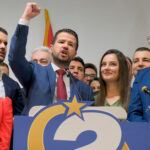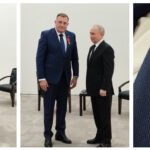- US, EU slap sanctions on Serbian companies, nationals over cooperation with Russia
On February 23, the US Department of Treasury’s Office of Foreign Assets Control added Serbia-based Goodforwarding, Kominvex, Research and Development Company TR Industries, and Soha Info to its sanctions list for aiding Russia’s war against Ukraine. Dragan Dragas, owner of Soha Info, and Marko Svorkan, owner of Kominvex, have also been designated.
With this decision, Washington brought the number of designated persons and entities to almost 300.
On February 23, the European Union adopted the 13th package of Russia sanctions, aimed at further limiting Russia’s access to military technology imports. The sanctions list includes 106 persons and 88 entities.
The new list includes, among others, companies that procure key drone components for Russia. Also, some sectoral sanctions were imposed to close down the existing loopholes for evasion and make it more challenging for Russia to use UAVs in combat.
The 13th sanctions package, in particular, includes a company incorporated in Serbia. According to media reports, the firm in question is Conex.
The decisions by the US and EU to slam sanctions on Serbian companies, in addition to the direct goal of banning the importation of military goods and technologies to the Russian Federation, sends yet another signal to the Serbian authorities, businesses, and general publics that assisting Russia in its war against Ukraine is unacceptable.
- Dodik meets with Putin
President of Republika Srpska (Bosnia and Herzegovina) Milorad Dodik met with President of the Russian Federation Vladimir Putin in Kazan (Russia) on February 21.
During the meeting, Putin conferred on the RS leader the Order of Alexander Nevsky.
Putin noted that cooperation with Republika Srpska is developing in various fields. “We are very happy with what has been done, and I expect that even more will be done in our relations,” he said.
Dodik emphasized that Republika Srpska is doing its best to reject any possibility of Bosnia and Herzegovina joining EU’s Russia sanctions, adding that he opposes BiH’s bid to join NATO.
In an interview with the Russian propaganda media agency RT, the president of Republika Srpska emphasized that during the meeting with Putin, he “wished him further victories”, saying “that all his victories, Russia’s victories, are our victories, too.”
By meeting with Putin once again, Dodik obviously tried to assure the Russian leadership of his loyalty to Moscow and sought to enlist Russia’s support to pursue his separatist course to achieve de facto independence of Republika Srpska.
- Serbia avoids joining Russia sanctions
Serbian President Aleksandar Vučić said this in an exclusive interview with the Russian state-run news agency, TASS.
“When the conflict kicked off in Ukraine, I said I didn’t know how things would develop. And then we made a decision at the state level to condemn the conflict, just like everyone else, but we said that our position is not to impose sanctions [against the Russian Federation] …We have a nation that is friendly to us, and it would be unfair to do this to the Russian people,” said Vučić.
“It’s been exactly two years now. Serbia is the only country in Europe that hasn’t imposed any sanctions,” Vučić emphasized, adding that at every international event he attends, “the main topic is sanctions against Russia.”
“We will try to defend our position for as long as possible. We have managed to do so for two years now. I don’t know if we will continue to do it, but I hope we will,” he said.
Vučić’s statements were intended to convince Moscow of the reluctance of the Serbian authorities to introduce sanctions against the Russian Federation, as well as to inform the Russian leadership of the complexity of such a position for Belgrade due to constant pressure Serbia is facing from the international community.
The position of the President of Serbia can be taken as an assurance that Belgrade is not going to introduce sanctions against Russia in the near future. At the same time, Vučić’s words that he “does not know” whether such a policy will continue, look like an admission that the Serbian authorities cannot completely rule out joining the sanctions policy pursued by the West.
- Diplomatic row breaks out between Serbia and Croatia
The Minister of Foreign and European Affairs of Croatia, Gordan Grlić -Radman, in an interview with the regional TV channel N1, labeled Aleksandar Vučić a “satellite of Russia.”
Answering a question about the situation in neighboring Bosnia and Herzegovina, Grlić-Radman noted that everyone is already used to the various statements voiced by Milorad Dodik (who constantly declares his intentions to have Republika Srpska secede from Bosnia and Herzogovina). “The EU recognizes only territorial integrity and sovereignty, Dodik has no place. As for Serbia, one thing is the citizens, and the other is Vučić and his policies, who has to decide which chair to sit on as sitting on two chairs is not too comfortable. He should not have a big dilemma,” the Croatian government official emphasized. Vučić may be a “Trabant and a satellite pf Russia”, but Russian influence or other harmful influences that would undermine the stability of the Western Balkans will not pass, the Croatian Foreign Minister emphasized. (Trabant was the name given in the Middle Ages to companions who performed the functions of servants and bodyguards).
Serbian President Aleksandar Vučić, commenting on Grlić-Radman’s statement, noted that the Croatian foreign minister not only brutally interferes in Serbia’s internal affairs, but also “lies, insults the Serbian people, and threatens the citizens of Serbia.” “Grlić-Radman is right in one thing: maybe I am someone’s Trabant, maybe a Wartburg, maybe Fića (brands of low-cost cars), but I have never been someone’s aide or servant, which cannot be said about Grlić-Radman,” the Serbian president wrote on Instagram.
First Deputy Prime Minister and Minister of Foreign Affairs of Serbia Ivica Dacic sharply condemned the Croatian minister’s statement. “The atmosphere of hatred towards Serbia and the Serbian people has been systematically growing in Croatia for years. One such example is the statement of Croatian Foreign Minister Hrlic Radman attacking Serbia and President Aleksandar Vucic,” he said. “The Croatian minister has not learned the lessons of history, so he forgets or wants it to be forgotten that Croatia was the most faithful Trabant of Austria-Hungary and Nazi Germany,” Dacic said.
The Ministry of Foreign Affairs of Serbia sent a note of protest to the Croatian Embassy in Belgrade due to the “unacceptable” statement by Croatian Foreign Minister Gordan Grlić-Radman.
The Ministry of Foreign and European Affairs of Croatia rejected accusations of interference in Serbia’s domestic affairs. Diplomats noted that Minister Gordan Grlić-Radman stated the fact of Serbia’s non-adherence to the foreign and security policy of the European Union regarding Russian aggression against Ukraine. “As we have already noted, one cannot be a candidate for EU membership and enjoy all the relevant benefits, unprincipledly and calculatedly avoiding the condemnation of Russian aggression and related EU policies,” the Croatian Foreign Ministry said in a statement.
The dispute between Zagreb and Belgrade over the refusal of the Vučić-led authorities to agree with the European Union on the foreign and security policy of Serbia as a candidate for EU accession, and to introduce sanctions against the Russian Federation, indicates aggravating tension around the topic. European politicians are now openly speaking up about the fact that Belgrade, by failing to impose sanctions, is pursuing an openly pro-Russian policy, leaving Vučić less and less opportunities to continue the policy of “sitting on two chairs at once”.
- President of Montenegro pulls from ruling Europe Now party
The founder and deputy head of the ruling Europe Now (Evropa sad) movement in Montenegro, the country’s President Jakov Milatović, resigned from all party positions and left the party altogether.
Commenting on his step-down, Milatović said the current activity of the political force contradicts commitments undertaken before voters and the values he was guided by when founding the party.
The Europe Now movement, in turn, accused the head of state of obstructing government and party’s work.
Meanwhile, Minister of Justice Andrej Milović was expelled from the party.
Local analysts predict that the conflict within the ruling party may lead to the resignation of the sitting government of Montenegro and slow down the country’s European integration process.



